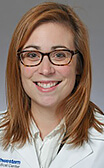
Mega Doctor News
By UT Southwestern Medical Center
Newswise — DALLAS – We all know the popular holiday song “It’s the Most Wonderful Time of the Year.” But for many people, a more appropriate lyric might be “It’s the Most Stressful Time of the Year.”
Buying gifts for loved ones, decorating the house, planning parties and dinners, and getting together with relatives – it’s all enough to send stress levels soaring.
Experts at UT Southwestern Medical Center say there are ways to manage stress and make your holidays much more enjoyable – and they start with adjusting your expectations, which will help relieve the pressure you put on yourself to achieve perfection.

Sarah Woods, Ph.D., Associate Professor and Vice Chair of Research in the Department of Family and Community Medicine, said remembering that the holidays are a season of gratitude can help ease the burdens we put on ourselves.
“Think about what you’re grateful for and put it in writing,” Dr. Woods said. “Focusing on the good can help you relax and cope with the not-so-good.”
A poll by the American Psychiatric Association in December 2022 showed that 31% of Americans expected to feel more stressed at the holidays compared with the previous year, with most of the anxiety linked to money. Rita Smith, a Licensed Clinical Social Worker in the Clinical Heart and Vascular Center at UT Southwestern, said it’s best to make a spending plan for gifts and celebrations because holiday debts can lead to additional stress in the new year. Be practical and creative with your gifting.
Dr. Woods said stress linked to strained family relationships can cause short- and long-term health problems. Feelings of stress produce cortisol, a hormone created by the adrenal glands that acts as an alarm system for the body. Elevated cortisol can cause disrupted sleep, headaches, inflammation, reduced pain tolerance, and shortness of breath.
When preparing to be with relatives, it helps to have a strategy, Dr. Woods said. Discuss with your partner how much time you wish to spend with family members and what conversations – politics, religion, parenting, education – should be off-limits. Stay attuned to each other’s signals: a hand gesture, a wink, or even a touch on the shoulder will work. If you find yourself in the middle of a difficult conversation with a relative, try saying: “I love you and respect you. Can we put this conversation on pause for now and talk about something else?”
The holidays can be especially difficult if you are caring for a loved one who is ill or spending your first holidays alone after a divorce or the loss of a spouse, Ms. Smith said.
“Excess stress wears and tears on our bodies,” she said. “The best holiday gifts you can give yourself are equal doses of self-care and grace.”
Ms. Smith recommended several ways to handle holiday stress:
- Self-care activities. Taking time out to exercise, get a massage, nap, or read a book is time well spent if it helps you stay positive.
- Healthy eating habits. Holiday celebrations invite overindulgence. Remember, food and mood are related.
- Stay socially engaged. If you’re sad because of a loss or disappointment, talk to your doctor, a trusted friend, or a counselor. There are many groups that provide support for people dealing with divorce, grief, or depression. Don’t isolate yourself from social activity, even if you don’t feel joyful.
- Volunteer. Many people have additional needs during the holidays. Take a meal to a neighbor, go to a senior center and visit the residents, or work with a food bank. You’ll feel a sense of purpose and accomplishment.
Dr. Woods holds the Stanley Gilbert, M.D. Professorship in Family Medicine.
About UT Southwestern Medical Center
UT Southwestern, one of the nation’s premier academic medical centers, integrates pioneering biomedical research with exceptional clinical care and education. The institution’s faculty members have received six Nobel Prizes and include 26 members of the National Academy of Sciences, 20 members of the National Academy of Medicine, and 13 Howard Hughes Medical Institute Investigators. The full-time faculty of more than 3,100 is responsible for groundbreaking medical advances and is committed to translating science-driven research quickly to new clinical treatments. UT Southwestern physicians provide care in more than 80 specialties to more than 120,000 hospitalized patients, more than 360,000 emergency room cases, and oversee nearly 5 million outpatient visits a year.









